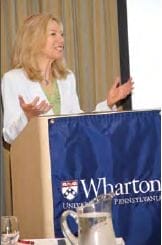Increasingly, businesses are seeing issues affecting the global environment as opportunities for innovation rather than hindrances to profit. But identifying those opportunities — and aligning them with corporate strategy — is an ongoing challenge. Wharton alumni addressed this challenge at the recent Global Alumni Forum in Costa Rica, held June 7-8, 2007, in San Jose.
Wide-ranging in scope, the event topics included big business and climate change, traditional and alternative fuels, emerging technologies, and the interdependent roles of the NGO and the company. Among the world leaders participating in the forum were Costa Rica President and Nobel Laureate Oscar Arias Sanchez, former U.S. Vice President Al Gore (via video conference), and Honduras President José Manuel Zelaya Rosales.
A t this event, Arias — who was presented with Wharton’s highest honor, the Dean’s Medal — took Costa Rica’s environmental leadership a step further, announcing a new environmental initiative for his country: “By 2021, Costa Rica’s 200th birthday, we will be a carbon-neutral country.”
Looking at the Ongoing Opportunities
In their addresses, Arias and Gore both suggested that current global environmental issues present both a crisis and an opportunity.
J. Craig Venter, whose company Celera Genomics is best known for its work on fully sequencing the human genome, reported on cutting-edge research on biodiversity in the oceans and possible biological sources of energy.
“Environmentalism is not a wave of the future,” said Wharton Professor Eric Orts, who is a world expert on environmental management. “Businesses, such as GE and Interface, have become leaders in this area.” Orts is leading an effort at Penn to establish a cross-disciplinary global environment and business initiative. The initiative would develop new ideas and opportunities for business on global environmental issues, bridging research and practice in the most immediate and actionable way.

























